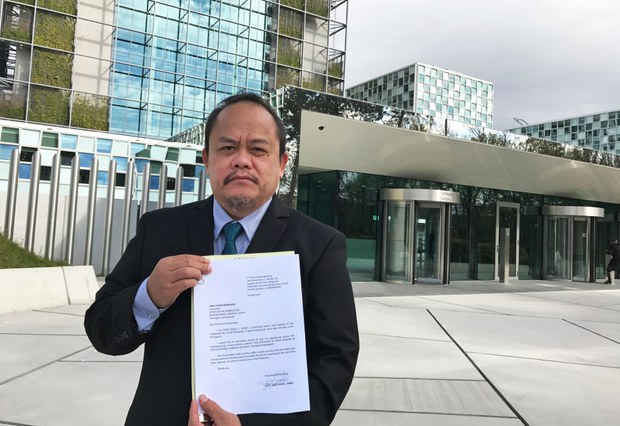Philippine Pullout Will Not Impact Preliminary Examination into Duterte’s Drug War: ICC
2018.03.21
Manila
 Standing outside the International Criminal Court in The Hague, Philippine lawyer Jude Sabio holds a 77-page complaint seeking an investigation into President Rodrigo Duterte’s war on drugs, April 24, 2017.
Standing outside the International Criminal Court in The Hague, Philippine lawyer Jude Sabio holds a 77-page complaint seeking an investigation into President Rodrigo Duterte’s war on drugs, April 24, 2017.
Updated at 1:38 p.m. ET on 2018-03-21
The International Criminal Court (ICC) says it will carry on with its preliminary examination into allegations linked to thousands of killings in the Duterte administration’s drug war, despite the Philippine government’s decision to withdraw from the ICC.
The Philippines was within its rights as a sovereign nation to pull out of the Rome Statute, an international treaty that created the court, but the country’s withdrawal could take effect only a year after notifying the U.N. secretary-general, The Hague-based ICC said in a statement.
“A withdrawal has no impact on on-going proceedings or any matter which was already under consideration by the court prior to the date on which the withdrawal became effective; nor on the status of any judge already serving at the court,” the ICC said Tuesday in response to the Philippine move to withdraw from the statute.
The Philippine government had notified U.N. Secretary-General Antonio Guterres about this in writing on March 17, the ICC noted.
“The court regrets this development and encourages the Philippines to remain part of the ICC family,” it said.
The ICC said its independent and impartial mandate was essential to help end impunity and ensure accountability, as well as strengthen the rule of law internationally.
‘Why are you here?’
On Tuesday in Manila, during a speech to the General Assembly of The League of Municipalities, Philippine President Rodrigo Duterte used profanity as he appeared to react to the statement from the ICC.
“’[W]e can continue with the investigation.’ Based on What?” the president said, according to an official transcript.
“Why are you here? Why are you f***** in my country? What’s your power? What vests you? The treaty? The treaty was not published,” Duterte added.
Two days earlier, the Philippine leader urged other countries to withdraw from the ICC, saying the Rome Statute had not been enforced in his country because it had never been printed in a government journal, as mandated by Philippine law, according to reports.
On Monday, Duterte's spokesman, Harry Roque, urged the ICC to "drop the case."
"Good luck on obtaining the cooperation of the Philippine state," he said, according to CNN Philippines.
Last week, when the Philippines notified the United Nations about pulling out of the treaty, it alleged that unnamed critics of Duterte’s drug war had successfully "weaponized" human rights to undermine his government.
Human rights groups have said Duterte made good on his promise to rid the country of drug pushers and users since he took office as president in mid-2016. More than 12,000 people have died in his administration’s war on narcotics, including three teenagers who were killed in an alleged shootout last year, according to rights advocacy groups.
Those incidents brought about widespread street protests spearheaded by the influential Catholic Church and a temporary halt to the police-led anti-drug operations. But in December 2017, Duterte reinstated police in a frontline role, saying their participation was necessary.
At least 4,043 people have died in police operations as of February – according to a tally by BenarNews of governmental figures – with rights groups blamed thousands of other unaccounted deaths on pro-government vigilantes.
‘Initial step’
In its statement, the ICC said Manila had ratified the statute in 2011, and that the court’s announcement to carry out a preliminary examination was an “initial step to determine whether there is reasonable basis to proceed.”
The court’s preliminary proceedings were based on a complaint by two former members of Duterte’s “Davao Death Squad” responsible for dozens of deaths carried out when the president was mayor of the southern city of Davao. They claimed that Duterte took the strategy nationwide when he became president.
On Feb. 8, the ICC prosecutor’s office, an independent organ of the court, announced it was opening a preliminary examination of allegations of extra-judicial killings carried out in the Philippine drug war.
The court emphasized that a preliminary examination was not an investigation, but an initial step that might lead to an investigation. During the examination, the prosecutor’s office “will engage with the national authorities concerned with a view to discussing and assessing any relevant investigation and prosecution at the national level,” the court added.
Since 1 July 2016, it has been alleged, thousands of persons were killed for reasons related to their alleged involvement in illegal drug use or dealing, the ICC said.
“While some of such killings have reportedly occurred in the context of clashes between or within gangs, it is alleged that many of the reported incidents involved extra-judicial killings in the course of police anti-drug operations,” the body said.







